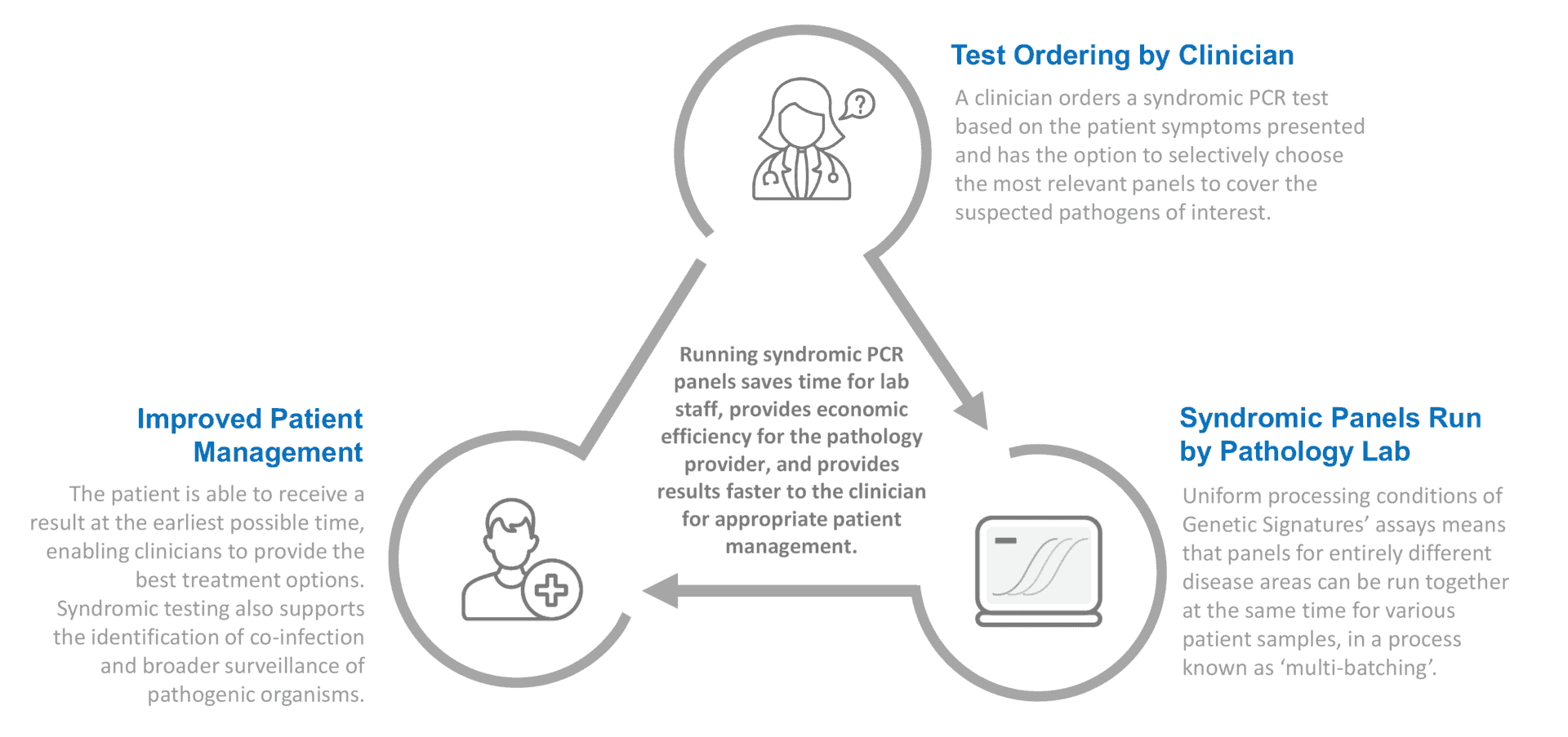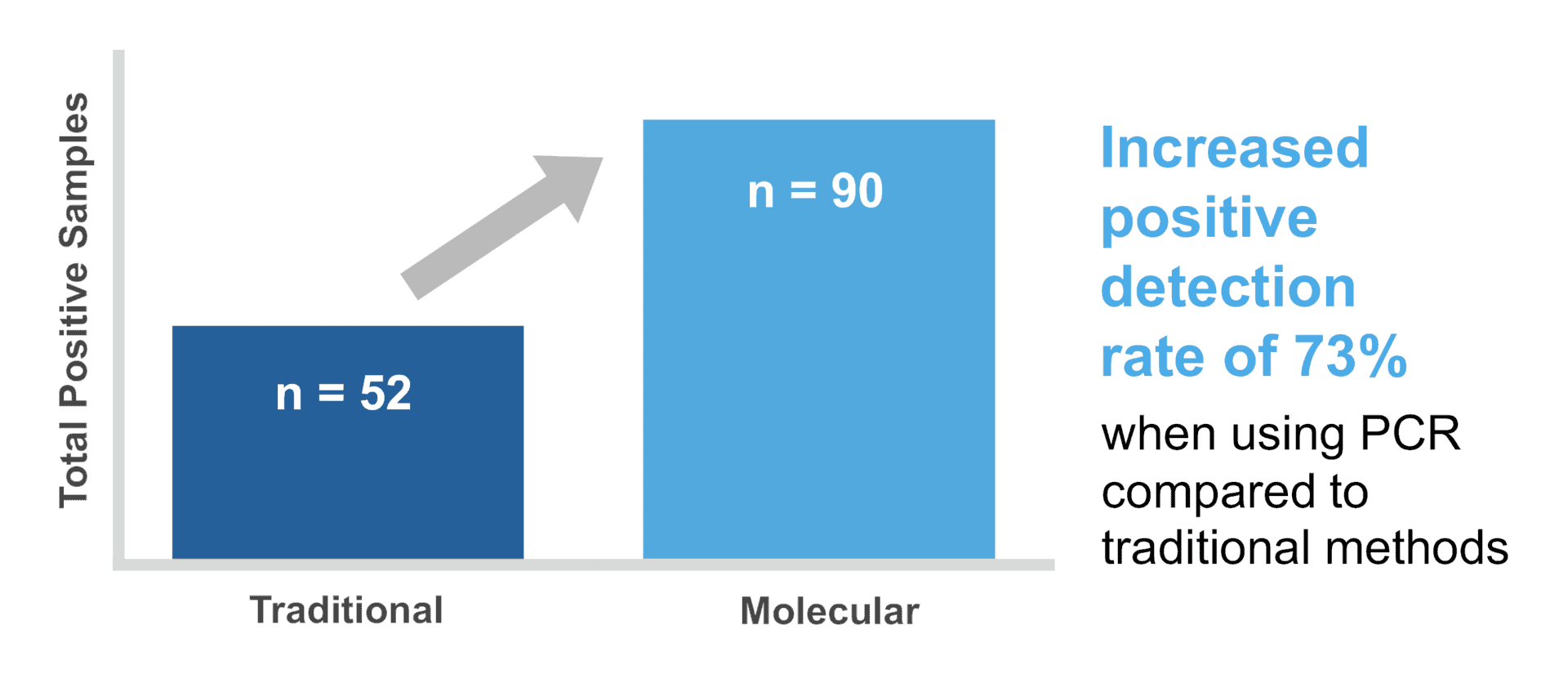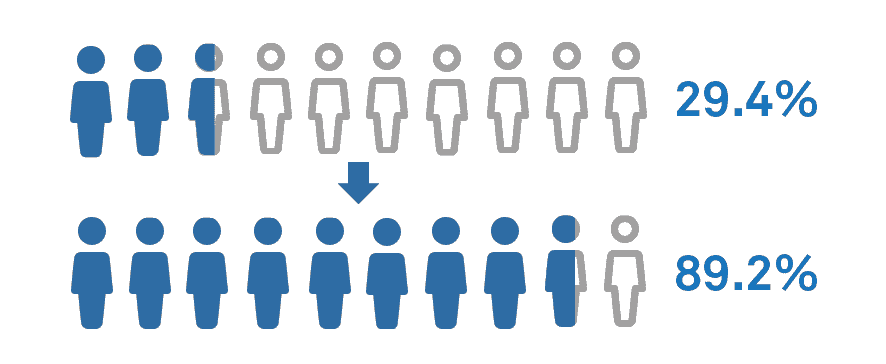What is Syndromic Testing?
Syndromic testing is the process of testing for multiple pathogens that may present with similar signs and symptoms in a patient. Possible pathogens are able to be discriminated with by using PCR tests that include a specific range of clinically relevant targets. Using PCR for syndromic screening can overcome the challenge of traditional diagnostic methods, which can take time, result in misdiagnosis, delay appropriate patient management, and result in economic burdens for the healthcare system and pathology providers.

Genetic Signatures Supports Syndromic Testing with Multiplex PCR Solutions
- Expansive assay menu: a broad range of pathogenic viral, bacterial, protozoan, fungal and resistance targets
- Configurable panels: ultimate flexibility in workflow to suit your testing requirements
- Maximise throughput: multiple automation platforms cater for medium to high throughput demands, regardless of sample type or number
- Uniform sample processing: for all specimen types, with 3base™ technology
- Improved efficiency and laboratory productivity
Syndromic Testing Across Many Disease Areas
Gastrointestinal (GI) Infection
Assays for over 30 bacterial, viral and protozoan pathogens
The symptoms and etiological possibilities for gastrointestinal infection can have many similarities, and pose challenges for efficient diagnosis. This includes bacterial, viral and protozoan parasites; all of which could be the single cause of a GI infection, or demonstrate co-infection. Although there are effective treatment options available for GI infection, obtaining timely and accurate diagnosis will ensure that patients get the best treatment as soon as possible.
Genetic Signatures offers specific syndromic screening solutions for GI protozoa, where 8 targets can be screened (EP005). In addition, Genetic Signatures also offers a broad selection of syndromic panels that can be selected individually to cover a range of suspected bacterial, viral or protozoan targets (PE001).

Compared to traditional non-molecular methods, Genetic Signatures’ enteric viral, bacterial and protozoan assays were able to increase positive detection rate by 73% in an evaluation study with 445 samples (UK, 2021).
Respiratory Infection
Assays for over 20 bacterial and viral pathogens
Respiratory infections often present with similar symptoms, despite a wide range of respiratory viruses across populations, as well as bacterial causes7. Since the COVID-19 pandemic, flu seasons will also now involve the convergence of SARS-CoV-2 and influenza-like illness, requiring clinicians to quickly distinguish between pathogens.
Genetic Signatures offers respiratory testing solutions that group together key respiratory viral and bacterial pathogens, allowing 14 targets to be screened for in a single batch (RP007). In addition, the processing conditions of other respiratory assays are compatible with each other, enabling different assays to be run together, such as Genetic Signatures’ SARS-CoV-2 Detection Kit (RP012). This can inform patient management, as well as broader surveillance initiatives.
Antimicrobial Resistance (AMR)
Assays for over 20 ESBL, CPO & MCR resistance gene targets
There is a growing number of reported gene targets in microorganisms that are indicative of antimicrobial resistance (AMR). Identifying the presence of these targets in patient samples with traditional methods of culture and microscopy can take from 3 days to several weeks, compared to the Genetic Signatures’ EasyScreenTM ESBL/CPO Detection Kit, which can provide results within 1 day. This assay includes targets for Extended-Spectrum Beta-Lactamases (ESBL) and Carbapenemase Producing Organisms (CPO), which are included on the list of WHO global priority pathogens (2019). Learn more about how PCR technology can help the fight against AMR by visiting our blog here.
Sexual Health
Assays for over 20 bacterial, viral, protozoan and fungal pathogens
Infectious pathogens that affect the reproductive system may present with similar signs and symptoms. Some sexually transmitted infections (STIs) may also be asymptomatic, including during routine screening, which puts demand on ensuring all clinically relevant pathogens are tested for. The occurance of co-infection also supports the need for syndromic screening of STIs with multiplex solutions.

